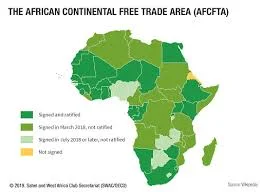 The African Continental Free Trade Agreement (AfCFTA) is gaining significant traction in West Africa as countries in the region begin to implement the trade pact. The agreement, which officially went into effect on January 1, 2021, is designed to create the largest free trade area in the world, uniting 54 African nations under a single market.
The African Continental Free Trade Agreement (AfCFTA) is gaining significant traction in West Africa as countries in the region begin to implement the trade pact. The agreement, which officially went into effect on January 1, 2021, is designed to create the largest free trade area in the world, uniting 54 African nations under a single market.
In West Africa, key economies such as Nigeria, Ghana, and Côte d’Ivoire have taken steps to operationalize the agreement, which aims to boost intra-African trade by eliminating tariffs on 90% of goods over the next five years. The AfCFTA is expected to facilitate cross-border commerce, increase economic diversification, and stimulate job creation across the region.
Key Highlights of AfCFTA in West Africa:
Tariff Reductions: Countries are reducing tariffs on various goods to facilitate easier and more cost-effective trade within the continent.
Customs Modernization: Efforts are underway to streamline customs processes to ensure smoother movement of goods across borders.
Job Creation: Economists predict that the AfCFTA could create millions of jobs in West Africa by opening new opportunities in sectors such as manufacturing, agriculture, and services.
The implementation of the AfCFTA in West Africa is also seen as a vital tool for economic recovery following the COVID-19 pandemic, which severely disrupted trade and supply chains. By reducing barriers to trade, countries in the region are expected to benefit from expanded markets, increased investment, and enhanced industrialization.
Nigeria’s Role in AfCFTA:
As the largest economy in Africa, Nigeria’s participation in the AfCFTA is pivotal to the success of the agreement. Nigerian businesses, particularly in the manufacturing and agribusiness sectors, are gearing up to take advantage of the broader market access. According to the Nigerian government, the AfCFTA could help boost non-oil exports, which are crucial for diversifying the economy away from crude oil dependency.
Challenges and Opportunities:
While the momentum behind the AfCFTA is growing, there are still challenges to overcome. Infrastructure deficits, non-tariff barriers, and the need for harmonized trade policies are seen as potential obstacles to fully realizing the benefits of the agreement. However, governments and trade organizations across West Africa are working to address these issues to ensure the successful implementation of the trade pact.
Next Steps:
The coming months will be critical as West African nations continue to align their national policies with the AfCFTA framework. Business leaders, policymakers, and trade experts are optimistic that the agreement will lead to sustainable economic growth and increased cooperation across the region.




















